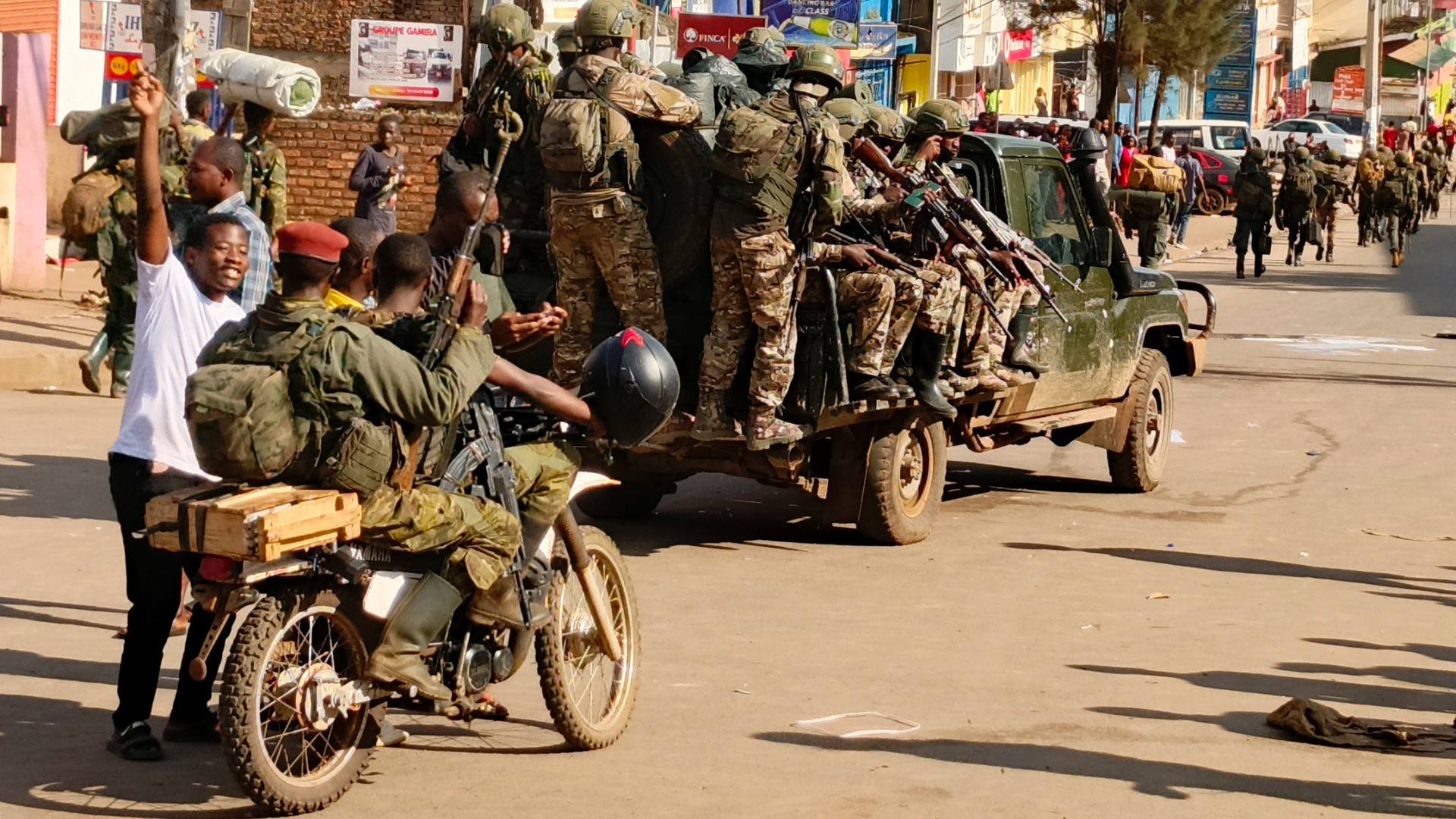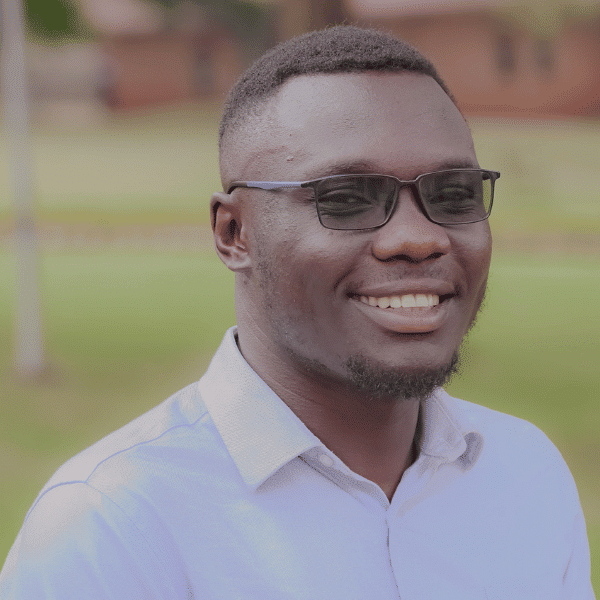M23 rebel forces took over the largest city in the Democratic Republic of the Congo. Residents who have not fled now wait to see what’s next.

M23 rebels enter Bukavu, Democratic Republic of the Congo,16 February 2025. (AP Photo/Janvier Barhahiga)
This article was produced exclusively for News Decoder’s global news service. It is through articles like this that News Decoder strives to provide context to complex global events and issues and teach global awareness through the lens of journalism. Learn how you can incorporate our resources and services into your classroom or educational program.
When M23 rebels overran Goma City in the Democratic Republic of the Congo (DRC) on 27 January, Jefferson Bwambale Nzundi was in the city for a meeting with several NGOs. Nzundi is partnerships lead at ReliefLine Uganda, a group involved in humanitarian aid and emergency response.
The conflict in the eastern regions of the DRC, driven by ethnic tensions and competition for mineral wealth, has escalated with the resurgence of the M23 rebels — a group primarily composed of Rwandan-speaking Tutsi fighters who fled the 1994 Rwandan Genocide to Congo.
The M23 now seeks to protect Tutsi interests in the region. As neighboring countries such as Rwanda and Uganda are implicated, the violent rebel attacks — an ongoing issue in the region — leave a devastating mark.
Yet, Nzundi and others initially dismissed warnings of a possible M23 assault as “a joke,” as the city, just days before another attack, remained eerily calm. But unsettled, Nzundi had consulted his seniors, who reassured him that United Nations troops would provide protection if battle ensued, offering him some confidence.
Still, wary of the escalating rumors, Nzundi left his hotel room and moved to a communal residence where six others had sought refuge. Located in a posh area of the city, far from the chaos, it felt safe — a place well-known for hosting the rich and expatriates. “It felt safe!” Nzundi recalled.
Gunshots in the streets
By 25 January, rumours had begun spreading about attacks in the more congested areas. The next day, while Nzundi was on the phone with his family in Rwanda, he heard a gunshot just outside their residential fence. He hung up, heart racing and dove for cover. The rat-tat-tat grew worse.
“It was like fireworks, bullets flying everywhere, the entire night,” he said.
Fortunately, they had stocked food for a couple of weeks and that enabled them to stay indoors the whole day.
By Monday morning, the rebels were attempting to take over Goma Airport.
“There was a big fight there — African soldiers, [United Nations] forces and a militia group called Wazalendo — funded by the DRC,” Nzundi said. The rebels eventually seized control of the airport, just “three kilometres from where we were staying.”
M23 takes over.
By Tuesday afternoon, the rebels had captured about 80% of Goma. Nzundi and others watched as rebel fighters advanced through the area where they were staying, with Congolese soldiers firing into the air while fleeing.
Nzundi said that a Congolese soldier had even come to their residence seeking refuge: “We had to ask him to leave because the M23 rebels were chasing soldiers with drones,” he said.
Another group of about 10 soldiers tried to take refuge with them, but Nzundi and colleagues refused to let them in.
“They were still armed, and it was too dangerous,” he said. “The Congolese army isn’t always disciplined, so we were scared for our lives — both from the rebels and from the army itself.”
The rebels had already taken control of key locations, including the airport, the local radio station and the governor’s office. “By midday, they had taken over everything,” Nzundi said.
People respond.
When they ventured outside, they saw people welcoming the rebels while clapping and cheering. Though it was a harrowing experience, Nzundi survived.
“There were times when I thought we wouldn’t make it, especially with bullets flying into the house,” he said. Some of the shells cracked through the windows of the building where they were hiding, landing on the floor — an adrenaline rush to those hiding beneath the beds.
With Canalbox, a French internet provider, cut off and power outages, Nzundi relied on the Rwandan network to stay in touch with his family. “I had to tell them I was running out of battery and would need to charge my phone using a generator,” he said. “They were panicking, interpreting any silence as a sign of his death.”
“I had to be on the phone with them constantly,” he said.
Through their residential camera, Nzundi saw armed thugs who had picked up weapons from the streets con three running civilians into safety only to shoot and rob from the dead. Congolese soldiers and mercenaries had abandoned their heavy weaponry and vehicles while fleeing the rebels’ advance.
Reuters recently reported a similar incident, in Bukavu — another city that the rebels have seized — where children picked up guns and uniforms deserted by fleeing militants.
The aftermath of a takeover
Nzundi’s boss had told them that someone from the United Nations would help them reach the border, but Nzundi was disillusioned: “The UN let the rebels through,” he said. “The city was on its own. The soldiers had all surrendered or fled.”
At the border, Nzundi would not leave the country without a stamp on his passport. “There was no functioning government to issue one,” he recalled. “But the Rwandan government accepted the M23 stamps.” On Thursday, he made his way to Kigali, registering his first-time experience in a bloody conflict.
A few days later, he returned to Goma, where he found that the government had set a day for residents to clean the debris from their front yards caused by the conflict.
Meanwhile, rumours spread that the East African Community (EAC) was convening to address the escalating crisis. The EAC is an eight-state intergovernmental organization of surrounding nations. A week later, the Joint EAC and 16-nation Southern African Development Community held a summit in Tanzania, calling for an immediate ceasefire in the eastern DRC. Goma, a vital business hub in North Kivu, is home to more than two million people and sits at the gateway to the DRC’s mineral-rich regions, bordering Rwanda.
The violence has displaced hundreds of thousands, with thousands of lives lost and other thousands injured. Yet, the M23 hunger for more, they now claim control of Bukavu and this means a rise in the death toll, injuries and displacements. The summit had called for a ceasefire, the reopening of Goma Airport and the restoration of vital services to facilitate humanitarian aid.
Violence follows violence.
The M23’s origins lie in the aftermath of the Congo Wars, which saw many Rwandan-speaking fighters — mostly Tutsis and Hutus — caught between returning to Rwanda or staying in the DRC. These fighters, unable to bear the massacre of around 800,000 Tutsis by Hutu extremists during the 1994 Rwandan Genocide, sought refuge in the Congo.
In the DRC, the presence of these refugees became a source of tension, fueling discrimination over citizenship, land rights and the perception of being outsiders.
In 2009, the National Congress for the Defense of the People (CNDP), a militia formed by these fighters, struck a peace deal with the DRC government. But when integration into the Congolese army failed in 2012, the M23 emerged, named after the collapse of that peace agreement on 23 March 2009.
The M23 have now resurfaced with renewed violence. Investigations have pointed to Rwanda’s support for the group, citing both the mistreatment of Rwandan speakers in DRC and Rwanda’s interest in the region’s mineral wealth — or expansionism tendencies.
In a recent CNN interview, when asked about Rwanda’s involvement in Goma, President Paul Kagame responded: “I don’t know.”
His surprise evasion was notable considering his role as commander-in-chief of the Rwandan army. Kagame quickly shifted the blame, suggesting Uganda would have more answers — that’s where the M23 had likely resurfaced from.
Nations tied together
Why Uganda? When M23 had first seized Goma in 2012, the Congolese army, alongside United Nations peacekeepers, pushed the rebels out, forcing many M23 fighters to flee to Uganda. Kagame’s argument that the group has returned from Uganda adds another layer to the regional complexity.
Meanwhile, Uganda’s first son, General Muhoozi Kainerugaba, dubbed by Uganda’s opposition as the “Twitter General,” has only escalated suspicions of Uganda’s involvement. Known for provocative social media posts, he once referred to M23 fighters as “uncles,” signalling support for their cause. Critics argue that his posts often come under the influence of alcohol. His father, Ugandan President Yoweri Museveni, was once forced to apologize to Kenya when the first son claimed he and his army would seize Nairobi — Kenya’s capital — within two weeks.
But both Rwandan and Ugandan presidents have a history of guerrilla war — and they are not ashamed of reminding anyone that “fire fights fire!” nor could anyone dismiss their support for the Congolese rebel group. After all, that’s how they both took over their respective presidencies.
As the security situation in the DRC continues to spiral, the region’s deep-seated ethnic and political divisions are becoming more glaring.
Scars of colonialism
Dr. Thomas Otieno Juma, lecturer of public administration at the University of Kabianga in Kenya, pointed to a historical root of these challenges. He argued that the borders drawn by Western colonial powers during the 1884–85 Berlin Conference still serve as a major factor in East Africa’s contemporary turmoil.
These boundaries, Juma explains, fractured once-cohesive ethnic groups like the Hutu and Tutsi, originally concentrated in Rwanda and Burundi, dispersing them across the DRC’s borders with Rwanda, Uganda and Burundi. This fragmentation, he said, has been central to the conflicts that have plagued the region, particularly since the 1990s, with the aftermath of the Rwandan Genocide and the eruption of the Congo Wars.
The DRC’s vast size and the arbitrary borders the colonial powers set created governance challenges, he said.
“The centralisation of power under Belgian rule and the neglect of local governance structures left a fragile Congolese state that has struggled to maintain unity,” Juma said. “The DRC’s diversity, coupled with its resource-rich eastern regions, has made it a focal point for regional conflicts and ethnic violence.”
It would be difficult, however, to reverse the Berlin Conference, said Ugandan scholar Dr. Samuel Kazibwe. “It’s very difficult to redraw the map because that would instead lead to more disastrous conflicts,” Kazibwe said. “In fact, that’s why the Constitutive Act which establishes the African Union emphasizes the inviolability of colonial borders.”
Nzundi hails from a tribe which was split between Uganda and Congo, and believes split borders alone shouldn’t be a reason for such violence.
“There are many theories as to the causes of the conflict,” Nzundi said. “Mineral wealth, tribal affiliations, foreign interference. The Berlin Conference divided Africa without considering tribal ties, and that’s still causing issues today.”
The conference also failed to consider the needs of the people of the region.
“Ultimately, the Congolese are tired of the lack of basic amenities like water, electricity and stable housing in the Congo,” Nzundi said. “So they see M23 as their hope.”
Questions to consider:
- Who are the M23 and why are they called that?
- How can the civil war in the DRC affect neighboring Uganda?
- Do you think the United Nations should send in troops to countries experiencing civil war? Why?

Enock Wanderema is News Decoder's correspondent in Uganda. He has written articles about identity, the environment, wildlife conservation and politics. He loves writing and bringing complex stories to life in the simplest ways.
